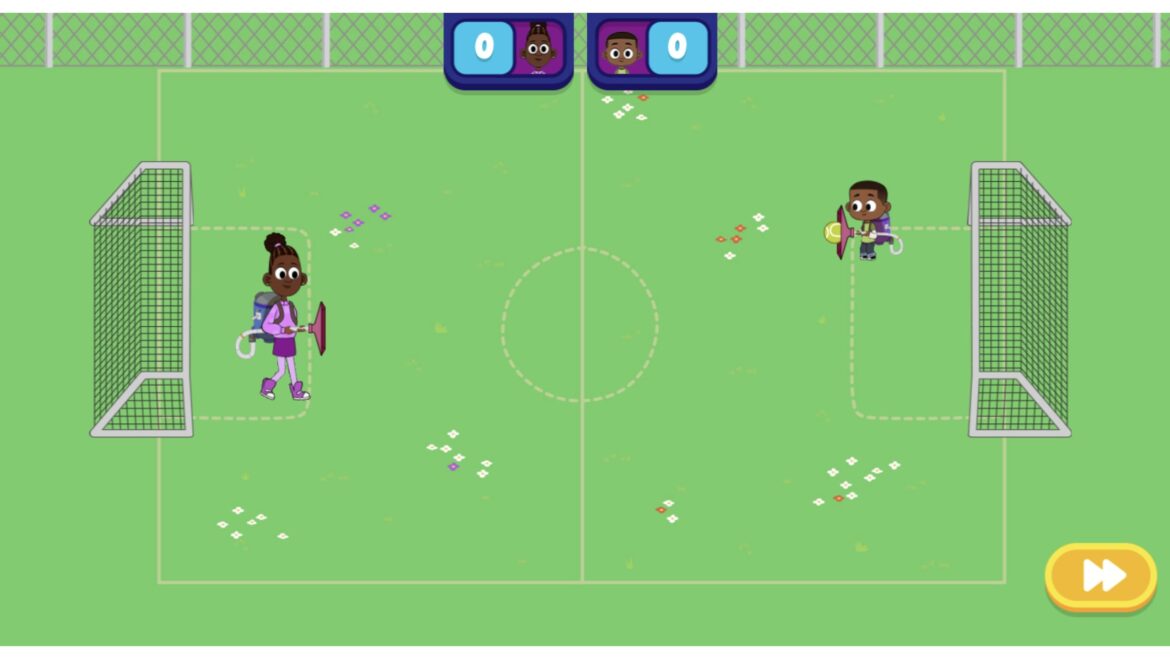Growth of games on PBS Kids aims to meet children where they are

PBS Kids
"Vacuum Hockey," a game based on the PBS Kids series "Lyla in the Loop," challenges users to launch a variety of objects into the opposing player’s net.
Visitors to PBS Kids’ digital platforms find an explosion of options — games to learn about music, math, animals and space. They can play “Vacuum Hockey,” create a story or explore mazes.
In total, the PBS Kids Games app and website host approximately 375 games.
A child who discovered PBS Kids Games on New Year’s Day could play a different game every day this year without repeating themselves. And for PBS Kids’ target demographic, that variety is king.
“It’s a lot of content, but we’re reaching a really big audience,” said Abby Jenkins, senior director of content at PBS Kids. The target audience includes children between the ages of 2 and 8. “They are gamers. They are born gamers.”

Since July, PBS Kids has introduced nine new games to the platform. The content team plans to release another 10 by the end of June, Jenkins said.
Two of the new games are tied to Lyla in the Loop, the animated series that teaches problem-solving skills to children ages 4 to 8. “Vacuum Hockey,” which is essentially the great-great-great granddaughter of pong, is one of them. The other, “Stu’s Super Stunts!,” allows Lyla’s furry blue sidekick to morph into a ball, frisbee or kite. Players must figure out the combination of playground equipment, directions, speeds and starting positions that will enable them to land Stu in specific locations.
Launches of new games are tied to premieres of new TV series, Jenkins said. One of the most successful PBS Kids series for game launches was Work It Out Wombats!, which premiered in February 2023. Three games created for the show — “Road Repair,” “Toy Maker” and “Story Emporium” — have garnered 20 million game plays to date on the PBS Kids games app and almost 7 million game plays on PBS Kids website.
Since the 2016 launch of the PBS Kids Games mobile app, the audience has grown year-over-year, Jenkins said. “Games have been in a constant upward trend.” The PBS Kids Games app now attracts an average of 2.6 million monthly users. The PBS Kids website reaches an average of 7.4 million monthly users.
Research studies published in 2019 reported that PBS Kids media and the Play & Learn Science app helped preschoolers understand science and engineering concepts. One study involved children who played digital games based on the science curricula of The Cat in the Hat Knows a Lot About That! That multimedia property, which included a TV show and digital games, had “meaningful impacts” on children ages 4 to 5. Children who used the Play & Learn Science app in what researchers called a “supportive environment” learned science and engineering practices and began using a science vocabulary. Both studies were funded by the Ready To Learn project.
While helping prepare kids to succeed in school is at the core of PBS Kids, it’s also a place where children go for entertainment. “When you look at the general landscape of kids’ media usage, we know that the top two activities are watching videos and playing games,” Jenkins said. “So it’s important that PBS Kids is there because we know that’s what kids in this age group are doing. We’re about being where our audience is.”
‘Keep the learning going’

Preschool educators have told Mouna Algahaithi, an early learning education specialist for PBS Wisconsin, that they supplement their lesson plans with relevant PBS Kids games. For a lesson about rockets, for example, they’ll assign kids to play a PBS Kids game from “Ready Jet Go!”
PBS Wisconsin recently developed its own learning plan from the game “Vacuum Hockey.” The objective of the game is to launch objects into the opposing player’s net. The difficulty increases with different objects or playing surfaces. In PBS Wisconsin’s lesson plan, kids set up ramps covered with bubble wrap or aluminum foil, Algahaithi said. “[K]ids are getting the idea of friction and motion in a variety of settings, digitally and hands-on.”
Education staff at Nine PBS in St. Louis also use PBS Kids games to help reinforce different curriculum sets that are presented at workshops for parents and caregivers, said Angie Carr, VP and chief impact officer.

“We encourage families to take those learnings in our sessions and turn on the content and play the games at home to keep the learning going,” she said. Game time at home is important because it helps parents and caregivers adjust to a child’s unique learning needs “so they can ensure they’re succeeding in school and in life.”
Jenkins shared an anecdote from a parent who described how their child set up an imaginary frozen yogurt stand on the playground. The idea came from the PBS Kids game “Donkey’s Froyo Stand,” which shows players how to follow the correct sequencing in taking a customer’s order for a frozen yogurt. “Those kinds of things are big wins for us, when we see it continue to that next level,” Jenkins said.
Jenkins oversees a playtesting program that invites kids and families to try games that are in development. A consistent thread to the feedback she hears from parents and caregivers is all PBS Kids games should be educational in some way. They have also asked for more games that allow them to play alongside children.
“We know that parents are comfortable letting kids drive the experience on their own, which is great,” Jenkins said. Her team also is thinking about creating games that “encourage parents and kids to want to play together.”
“Vacuum Hockey,” the new game based on Lyla in the Loop, fits this model. “For parents that was very gettable,” she said. “They knew immediately how they could play it and they recognized that kind of mechanic.”
Another co-play game is “Toy Maker” from Work It Out Wombats! It features the characters Grandma Super and Zadie, and prompts players to play and learn together as they create a toy. The game encourages players to cooperate by telling them to , “talk about what toy you’d both like to create,” and asking questions such as, “Do you both like how the toy looks?”
Looking ahead, Jenkins said her team wants to add more games with accessibility features, such as sound options and closed captioning, as well as new offerings in Spanish.
PBS Kids games are designed for local gameplay only and lack the technology for children to connect with other players via the app or website. Since making the games as accessible as possible is a key priority, the games are downloadable for offline play, Jenkins said.
But the PBS Kids team is very aware that the landscape is shifting to games with online multiplayer capabilities. In the PBS Kids world, that could include inviting trusted friends, cousins or grandparents in other cities to play.
“Kids gaming in just the general landscape is social these days,” Jenkins said. “When you look at ‘Minecraft’ and other kinds of massive multiplayer types of games, it’s something we’re thinking about.”
Corrections and clarifications: This article has been updated to acknowledge two digital platforms that host free games for children, the PBS Kids Games app and the website pbskids.org. The earlier version incorrectly identified Abby Jenkins as senior director of interactive content. She is director of content for PBS Kids. In addition, the earlier version erroneously reported that the co-play game “Toy Maker” is based on Wild Kratts. It is from Work It Out Wombats!





